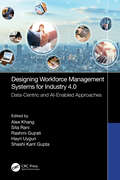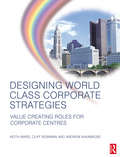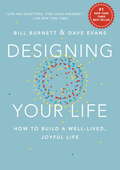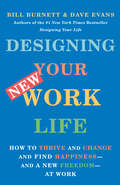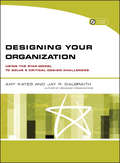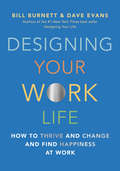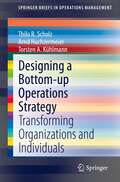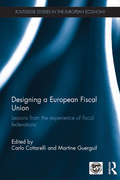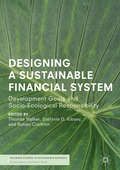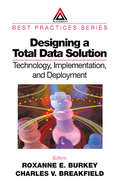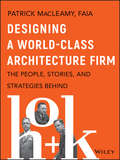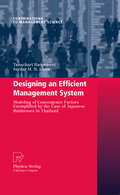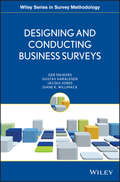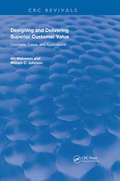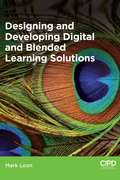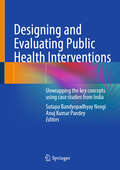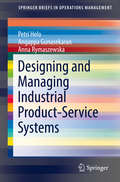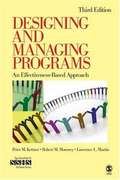- Table View
- List View
Designing West Africa: Prelude To 21st Century Calamity
by Peter SchwabMany African nations are now described as 'fourth world nations', ones which essentially have no future. How could this have happened? Through the scope of the 1960's, the first decade of African independence, Peter Schwab presents a compelling and provocative answer to this question. Designing West Africa tells the story of a pivotal decade in African history, when the fate of the continent was decided. Focusing on the six most visible leaders of the period - painting detailed portraits of them both as leaders and as people - Schwab looks at how Africa served as a ground to play out larger international conflicts, namely the Cold War. He does not fall back on blaming non-African involvement for the failure to build a visible leadership for the continent; rather he critiques the African leaders themselves for their individual failings.
Designing Workforce Management Systems for Industry 4.0: Data-Centric and AI-Enabled Approaches
by Alex Khang Sita Rani Rashmi Gujrati Hayri Uygun Shashi Kant GuptaThis book brings insight to the HR management system and offers data-centric approaches and AI-enabled applications for the design and implementation strategies used for workforce development and management. Designing Workforce Management Systems for Industry 4.0: Data-Centric and AI-Enabled Approaches focuses on the mechanisms of proposing solutions along with architectural concepts, design principles, smart solutions, and intelligent predictions with visualization simulation. Data visualization for the metrics of management systems and robotic process automation applications and tools are also offered. This book is also useful as a reference for those involved in AI-enabled applications, data analytics, data visualization, as well as systems engineering and systems designing.
Designing World Class Corporate Strategies
by Keith Ward Andrew Kakabadse Cliff BowmanDesigning World Class Corporate Strategies considers the key role of corporate centres within very large, primarily multi-business organisations. At present, these corporate centres are under attack as not creating and value and merely adding cost to their groups.The authors have developed a corporate configurations model which demonstrates four ways in which corporate centres can add significant value. However this requires the centre to act in specific ways depending on the external environment in which the group is operating.Designing World Class Corporate Strategies is highly readable, with a large number of illustrative examples included in the text. Academic references and theoretical underpinnings are placed in the final chapter of the book, so that the book is focused on the professional market for strategy and creating value.
Designing Your Life: How to Build a Well-Lived, Joyful Life
by Dave Evans Bill BurnettAt last, a book that shows you how to build--design--a life you can thrive in, at any age or stage Designers create worlds and solve problems using design thinking. Look around your office or home--at the tablet or smartphone you may be holding or the chair you are sitting in. Everything in our lives was designed by someone. And every design starts with a problem that a designer or team of designers seeks to solve.In this book, Bill Burnett and Dave Evans show us how design thinking can help us create a life that is both meaningful and fulfilling, regardless of who or where we are, what we do or have done for a living, or how young or old we are. The same design thinking responsible for amazing technology, products, and spaces can be used to design and build your career and your life, a life of fulfillment and joy, constantly creative and productive, one that always holds the possibility of surprise.From the Hardcover edition.
Designing Your New Work Life
by Dave Evans Bill BurnettFrom the authors of the #1 New York Times bestseller Designing Your Life—a timely, urgently needed book that shows us how to transform our new uncharted work life into a meaningful dream job or company. With updated tools, tips, and design ideas that show us how to navigate disruption (global, regional, or personal) and create new possibilities for our post-COVID work world and beyond.Bill Burnett and Dave Evans successfully taught graduate and undergraduate students at Stanford University and readers of their best-selling book, Designing Your Life ("The prototype for a happy life." —Brian Lehrer, NPR), that designers don't analyze, worry, think, complain their way forward; they build their way forward. And now more than ever, we all need creative and adaptable tools to cope with the chaos caused by COVID-19. In Designing Your New Work Life, Burnett and Evans show us how design thinking can transform our present job, and how it can improve our experience of work in times of disruption. All disruption is personal, write Burnett and Evans, as with the life-altering global pandemic we are living through now. Designing Your New Work Life makes clear that disruption is the new normal, that it is here to stay and that it is accelerating. And in the book's new chapters, Burnett and Evans show us step by step, how to design our way through disruption and how to stay ahead of it—and thrive. Burnett and Evans's Disruption Design offers us a radical new concept that makes use of the designer mindsets: Curiosity, Reframing, Radical collaboration, Awareness, Bias to action, Storytelling, to find our way through these unchartered times. Burnett and Evans show us, with tools, tips, and design ideas, how we can make new possibilities available even when our lives have been disrupted (be it globally, regionally, or personally), giving us the tools to enjoy the present moment and allowing us to begin to prototype our possible future.
Designing Your Organization
by Jay R. Galbraith Amy KatesDesigning Your Organization is a hands-on guide that provides managers with a set of practical tools to use when making organization design decisions. Based on Jay Galbraith's widely used Star Model, the book covers the fundamentals of organization design and offers frameworks and tools to help leaders execute their strategy. The authors address the five specific design challenges that confront most of today's organizations:· Designing around the customer· Organizing across borders· Making a matrix work· Solving the centralization--and decentralization dilemma· Organizing for innovation
Designing Your Own Workforce of One: Cultivating a Customized Employment Experience in Your Organization
by Susan Cantrell David Y. SmithCompanies have excelled by treating customers as "markets of one," offering them personalized buying experiences. But in managing their own workers, most firms still use one-size-fits-all HR practices. A better approach, according to talent management experts Susan Cantrell and David Smith, is to treat each employee as a "workforce of one." In this chapter they help you determine your own unique path toward managing your workforce as a workforce of one by choosing which of four customization approaches-workforce segmentation, modular choices, broad and simple rules, or employee-defined personalization-will work best in your organization, based on your specific business needs and types of employees. The chapter concludes with an inside view of how four leading companies-Best Buy, Procter & Gamble, Men's Wearhouse, and the Royal Bank of Scotland-chose the customization approaches that best suited their organizations. An easy-to-take quiz will help you do the same. This chapter was originally published as Chapter 6 of "Workforce of One: Revolutionizing Talent Management Through Customization."
Designing Your Work Life: How to Thrive and Change and Find Happiness at Work
by Dave Evans Bill BurnettFrom the authors of the #1 New York Times best seller Designing Your Life ("Life has questions. They have answers" --The NYT)--a job-changing, outlook-changing, life-changing book that shows us how to transform our work lives and create a dream job that is meaningful without necessarily changing the job we have.Dysfunctional Belief: I'm stuck in a lousy situation (and there's nothing I can do about it). Reframe: I'm stuck in a lousy situation (and I'm finding the problems and the solutions). Bill Burnett and Dave Evans successfully taught graduate and undergraduate students at Stanford University and readers of their best-selling book, Designing Your Life ("The prototype for a happy life." --Brian Lehrer, NPR), that designers don't analyze, worry, think, complain their way forward; they build their way forward. In Designing Your Work Life, Burnett and Evans show us how design thinking can transform our present job and our experience of work in general by utilizing the designer mindsets: Curiosity. Reframing. Radical collaboration. Awareness. Bias to action. Storytelling. Dysfunctional Belief: Good enough isn't good enough. Reframe: Good enough is GREAT--for now. Burnett and Evans show us how, with tools, tips, and ideas, to enjoy what we have and to live in a state of "good enough, for now," one of the strongest, most effective reframes there is, and how this idea, once understood and accepted, can make new possibilities available, giving us the energy to enjoy the present moment and allowing us to begin to prototype possible futures. And if we want to quit? Burnett and Evans show us how to use the job we have to get the job we want (in another company), and show us as well, the art and science of quitting (leave the campsite better than we found it), using the power of the quit design to reframe how we finish our current job and get a better one. They write, as well, about how the work world is changing as the automation of work increases (hello Alexa, artificial intelligence, drones, and robots); how thinking like a designer can make us flexible, and ready to adapt to change . . .
Designing Zero Carbon Buildings: Embodied and Operational Emissions in Achieving True Zero
by Ljubomir JankovicIn this significantly revised third edition, Designing Zero Carbon Buildings combines embodied and operational emissions into a structured approach for achieving zero emissions by a specific year with certainty.Simulation and quantitative methods are introduced in parallel with analogue scale models to demonstrate how things work in buildings. Where equations are provided, this is also explained with common analogue objects, pictures, and narratives. A Zero Equation introduced in this book is not only explained as an equation but also as an analogy with a jam jar and spoons, making the book accessible for a range of audiences. Tasks for simple experiments, exercises, discussion questions, and summaries of design principles are provided in closing lines of chapters.This book introduces new case studies, in addition to an updated case study of the Birmingham Zero Carbon House, applying embodied and operational emissions to assess their status using the Zero Equation. The approach introduced brings about a sense of realism into what true zero emissions mean. Written for students, educators, architects, engineers, modellers, practising designers, sustainability consultants, and others, it is a major positive step towards design thinking that makes achieving zero carbon emissions a reality.
Designing a Bottom-up Operations Strategy: Transforming Organizations and Individuals (SpringerBriefs in Operations Management)
by Arnd Huchzermeier Thilo R. Scholz Torsten A. KühlmannThis book focuses on top-down and bottom-up antecedents for employee engagement. It combines Operations Management (OM) with elements from Human Resource Management (HRM) and Organizational Behavior (OB) to answer the overarching question: “How is operations strategy formation influenced by the individual employee?” Dedicated chapters investigate key research questions, closing the integration gap between OM and HRM/OB. The book develops and statistically analyzes an operations strategy opportunity-motivation-ability framework. In addition, it examines how basic need fulfillment and organizational fairness relate to job satisfaction and performance. By doing so, the book helps readers to better understand employees’ preferences and enables operations managers to foster strategy-supportive behavior and job satisfaction more effectively in their workforces.
Designing a Compliance Program at AB InBev
by Eugene SoltesCompliance programs help companies align the interests and behavior of employees with external expectations and regulation. The case discusses how ABInBev, a major brewer, developed its compliance program.
Designing a Document Strategy
by Kevin CraineDesigning a Document Strategy, by Kevin Craine, MBA, is a book for managers, technicians and consultants who want to implement a document strategy for a large organization. The book describes a five-phase process that will guide readers through the design of document strategy tailored to their particular situations. Cause-effect diagrams, flow charts, and return on investment are presented in easy to understand terms. Case examples demonstrate how the methods in the book can be applied in the real world. As a result, readers are better prepared to take meaningful and informed action. Whatever decisions and recommendations readers ultimately make, they will be more likely to bring about real-world, bottom-line benefits. There is no better educational resource on designing a document strategy than this book.
Designing a European Fiscal Union: Lessons from the Experience of Fiscal Federations (Routledge Studies in the European Economy)
by Carlo Cottarelli Martine GuerguilDoes the European Union need closer fiscal integration, and in particular a stronger fiscal centre, to become more resilient to economic shocks? This book looks at the experience of 13 federal states to help inform the heated debate on this issue. It analyses in detail their practices in devolving responsibilities from the subnational to the central level, compares them to those of the European Union, and draws lessons for a possible future fiscal union in Europe. More specifically, this book tries to answer three sets of questions: What is the role of centralized fiscal policies in federations, and hence the size, features and functions of the central budget? What institutional arrangements are used to coordinate fiscal policy between the federal and subnational levels? What are the links between federal and subnational debt, and how have subnational financing crises been handled, when they occurred? These policy questions are critical in many federations, and central to the current discussions about future paths for the European Union. This book brings to the table new, practical insights through a systematic and comprehensive comparison of the EU fiscal framework with that of federal states. It also departs from the decentralization perspective that has been prominent in the literature by focusing on the role of the centre (which responsibilities are centralized at the federal level and how they are handled, rather than which functions belong to the local level). Such an approach is particularly relevant for the European Union, where a fiscal union would imply granting new powers to the centre.
Designing a New Business Model: Finding an Ordered Structure to Unlock Creativity
by Mark W. JohnsonWe're all familiar with stories of visionary leaders whose brilliant insights revolutionize the market. But all of these inspiring stories can be downright depressing. No one wants to depend on something as fickle as inspiration to create a new business. And you shouldn't have to, says strategic innovation expert Mark W. Johnson. Indeed, conceiving of a truly innovative new business model does not need to be a matter of imagination and serendipity, or luck. It can be an orderly process that uses structure to unlock creativity, rather than the other way around. In this chapter, Johnson shows how the four-box framework-customer value proposition (CVP), profit formula, key resources, and key processes-can help you systematically generate the right questions and assumptions; organize and categorize them in a constructive way; and implement, test, and learn about them in the right order to create a new business model. The stories of Zara and Threadless illustrate how companies have used these four pillars to transform their industries. This chapter was originally published as Chapter 6 of "Seizing the White Space: Business Model Innovation for Growth and Renewal."
Designing a Sustainable Financial System: Development Goals and Socio-Ecological Responsibility (Palgrave Studies in Sustainable Business In Association with Future Earth)
by Thomas Walker Stéfanie D. Kibsey Rohan CrichtonThis edited collection brings together leading theoretical and applied research with the intent to design a sustainable global financial future. The contributors argue that our world cannot move toward sustainability, address climate change, reverse environmental degradation, and improve human well-being without aligning the financial system with sustainable development goals like those outlined by the United Nations. Such a system would: a) be environmentally and socially responsible; b) align with planetary boundaries; c) manage natural resources sustainably; d) avoid doing more harm than good; and e) be resilient and adaptable to changing conditions. The overarching theme in this collection of chapters is a response to the worldwide, supranational sustainable finance discussions about how we can transition to a new socio-ecological system where finance, human well-being, and planetary health are recognized as being highly intertwined.
Designing a Total Data Solution: Technology, Implementation, and Deployment (Best Practices Ser.)
by Roxanne E. Burkey Charles V. BreakfieldYour company's global competitiveness depends on the utilization and maintenance of information. Current data handling practices-storing, updating, and accessing data-can be either a problem or a significant strategic advantage for your company. Designing a Total Data Storage Solution: Technology, Implementation, and Deployment gives you the inform
Designing a World-Class Architecture Firm: The People, Stories, and Strategies Behind HOK
by Patrick MacLeamyOffers architects and creative services professionals exclusive insights and strategies for success from the former CEO of HOK. Designing a World Class Architecture Firm: The People, Stories and Strategies Behind HOK tells the history of one of the largest design firms in the world and draws lessons from it that can help other architects, interior designers, urban planners and creative services professionals grow bigger or better. Former HOK CEO Patrick MacLeamy shares the revolutionary strategies HOK’s founders deployed to create a brand-new type of architecture firm. He pulls no punches, revealing the triple crisis that almost bankrupted HOK and describes how any firm can survive and thrive. Designing a World Class Architecture Firm tells the inside story of many of HOK’s most iconic buildings, including the National Air and Space Museum, Moscone Convention Center, Oriole Park at Camden Yards, the Houston Galleria and the reimagined LaGuardia Airport. Each chapter conveys lessons learned from HOK’s successes —and failures— including: The importance of diversifying to depression-and-recession-proof your firm The benefit of organizing your firm around specialized leaders and project types The difference between leading and managing your people The value of simple financial metrics to ensure your firm’s health and profitability The “run toward trouble” strategy which prevents problems from ballooning MacLeamy delivers his advice via inspirational stories such as how HOK survived when its home office in St. Louis went up in flames and humorous stories, like the time an HOK executive was mistaken for royalty on a trip to Saudi Arabia. In this tell-all guide, the driven architecture or design professional will find the tools needed to evolve or grow any firm.
Designing an Efficient Management System
by Sardar M. Islam Tanachart RaoprasertThis book makes a significant and valuable contribution to the literature in the fields of organisational behaviour and design, performance analysis and structural equation modelling. The subject of this book is the development of an efficient and effective management system in the globalised world in order to improve overall organizational performance to achieve good corporate governance by reducing agency costs in a cross-cultural environment. Based on an empirical case study of Japanese management practices in Thailand, it examines factors that help to adapt management practices to the work culture of the host country and motivate local employees to adapt and implement unfamiliar management practices. The book provides a new methodological approach by applying structural equation modeling to psychosocial and motivational constructs of organizational performance, and thus presents an innovative behavioral framework of organizations in a contemporary cross-cultural setting.
Designing and Conducting Business Surveys
by Ger Snijkers Gustav Haraldsen Jacqui Jones Diane K. WillimackDesigning and Conducting Business Surveys provides a coherent overview of the business survey process, from start to finish. It uniquely integrates an understanding of how businesses operate, a total survey error approach to data quality that focuses specifically on business surveys, and sound project management principles. The book brings together what is currently known about planning, designing, and conducting business surveys, with producing and disseminating statistics or other research results from the collected data. This knowledge draws upon a variety of disciplines such as survey methodology, organizational sciences, sociology, psychology, and statistical methods. The contents of the book formulate a comprehensive guide to scholarly material previously dispersed among books, journal articles, and conference papers. This book provides guidelines that will help the reader make educated trade-off decisions that minimize survey errors, costs, and response burden, while being attentive to survey data quality. Major topics include: * Determining the survey content, considering user needs, the business context, and total survey quality * Planning the survey as a project * Sampling frames, procedures, and methods * Questionnaire design and testing for self-administered paper, web, and mixed-mode surveys * Survey communication design to obtain responses and facilitate the business response process * Conducting and managing the survey using paradata and project management tools * Data processing, including capture, editing, and imputation, and dissemination of statistical outputs Designing and Conducting Business Surveys is an indispensable resource for anyone involved in designing and/or conducting business or organizational surveys at statistical institutes, central banks, survey organizations, etc. ; producing statistics or other research results from business surveys at universities, research organizations, etc. ; or using data produced from business surveys. The book also lays a foundation for new areas of research in business surveys.
Designing and Delivering Superior Customer Value: Concepts, Cases, and Applications (Routledge Revivals)
by William C. Johnson Art WeinsteinFirst Published in 1999: This book stresses the service aspects of an organization - especially customer service, marketing, and organizational responsiveness, and how to create and provide outstanding customer value to the target market(s).
Designing and Developing Digital and Blended Learning Solutions
by Mark LoonDesigning and Developing Digital and Blended Learning Solutions is essential reading for anyone studying the Level 5 CIPD L&D module of the same name as well as all learning and development professionals looking to understand the growing role of technology in L&D. Covering both current and emerging learning technologies, this book will help readers assess which technologies are right for their needs. It also covers how to design blended learning solutions, how to develop digital learning content as well as how to evaluate the effectiveness of this digital content. Most importantly, Designing and Developing Digital and Blended Learning Solutions provides guidance on how to implement digital and blended learning solutions including identifying the appropriate platforms and the roles, tools and processes needed to support effective implementation. Full of practical examples and advice, this is an invaluable guide for students and practitioners alike.
Designing and Evaluating Public Health Interventions: Unwrapping the key concepts using case studies from India
by Sutapa Bandyopadhyay Neogi Anuj Kumar PandeyThis book covers all aspects of public health interventions, emphasizing the design, implementation, and evaluation of such initiatives. Section I provides information ranging from fundamental concepts of designing an intervention to its implementation and scalability. Section II highlights evidence around interventions to address pressing public health concerns through interesting case studies from India, that offer practical insights for better understanding. This book is relevant for researchers and academicians in public health, epidemiology, health management and economics, health policy, and allied branches. It equips readers to design and analyze interventions to improve practice.
Designing and Managing Industrial Product-Service Systems
by Petri Helo Angappa Gunasekaran Anna RymaszewskaThis book is dedicated to the issues and complexities of industrial services supply chain management. It analyzes how the transition from products to services can be managed, and how supply chains can be adjusted to reflect this new status quo. The book begins with chapters examining product-service systems structures and servitization - the services infusion process. Next, it presents industrial services as marketing and operations strategy. The focus shifts to service delivery, and this chapter discusses how the actual operations take place. This is followed by an examination of the role of technology and how connected assets are utilized by product vendors in value-creation. The book analyzes the transition from ownership to subscriptions in the pricing decisions chapter. Then the value chain effects chapter offers an overview of the mechanisms through which industrial companies are shortening the distance to end-users and aim for a better position in the value chain. Finally the conclusion addresses theoretical and empirical implications in the industrial services supply chain management.
Designing and Managing Programs: An Effectiveness-Based Approach
by Peter M. Kettner Lawrence L. Martin Robert M. MoroneyDesigning and Managing Programs: An Effectiveness-Based Approach, Third Edition, is an updated version of THE classic book on program management and design. This new edition is written in a deliberate manner that has students following the program planning process in a logical manner. Students will learn to track one phase to the next, resulting in a solid understanding of the issues of internal consistency and planning integrity. The book's format guides students from problem analysis through evaluation, enabling students to apply these concepts to their own program plans.

